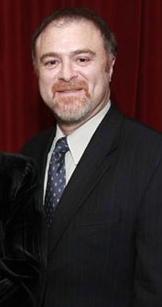|
Steven M. Zeitels
Steven Marc Zeitels (born November 7, 1957) is the Eugene B. Casey Professor of Laryngeal Surgery at Harvard Medical School and the Director of Massachusetts General Hospital (MGH) Center for Laryngeal Surgery and Voice Rehabilitation (MGH Voice Center). CareerZeitels grew up in New Rochelle, New York. He graduated from the BU School of Medicine in 1982.[1] He completed the BU - Tufts combined Otolaryngology – Head and Neck Surgery Program in 1987 as well as a Head & Neck Surgical Oncology Fellowship at BU and the Boston Veterans Affairs Medical Center in 1988.[citation needed] In 2004, the first endowed Chair in Laryngeal Surgery at Harvard Medical School was created for him.[citation needed] Zeitels has designed numerous new voice restoration procedures (phonosurgery) and surgical instruments, and holds six patents for these innovations.[citation needed] He is widely acknowledged for novel laser applications to treat dysplasia and cancer as well as laryngeal papillomatosis, polyps, nodules. He is also known for perfecting office-based laryngeal laser surgery. He introduced angiolytic laser treatment of vocal cord cancer, which evolved from Judah Folkman’s concepts of tumor angiogenesis and Rox Anderson’s theory of selective photothermolysis. He received the 2014 Broyles Maloney Award of the American Broncho-Esophagological Association. Zeitels has designed procedures to restore the voice of those who have had vocal paresis and paralysis. His techniques were featured in a National Geographic Channel documentary, “The Incredible Human Machine”, which highlighted Zeitels’ microsurgery on Steven Tyler of Aerosmith. Zeitels also performed an endoscopic removal of a tongue-base larynx cancer on Tom Hamilton, Aerosmith’s bass guitarist after radiation and chemotherapy failed to control his advanced throat cancer.[2] Zeitels removed precancerous dysplasia from Roger Daltrey's vocal fold just one month prior to his 2010 Super Bowl performance.[3] In 2012, there was broad international coverage of Zeitels' microsurgery to restore Adele's voice; she thanked him in the acceptance of the first of her six Grammy Awards.[4][5][6] Larry Page, the founder of Google, described his difficulties with vocal nerve injury and has been a supporter of Zeitels and the Voice Health Institute.[7][8][9] Zeitels conceived and directs the Voice Restoration Research Program, which is a collaborative effort of investigators at Harvard and MGH, as well as Robert Langer at MIT. They have spent over a decade developing a biomaterial that would restore the largest majority of human voice loss and the research group received the 2010 Broyles Maloney Award of the American Broncho-Esophagological Association for their effort. They hope to initiate human trials to test the new vocal biogel in 2018.[10] Personal lifeWhile in Chile lecturing as a guest of the Chilean Society of Otolaryngology in 2001 he met Maria Nuria Hananias, a Chilean otolaryngological surgeon. Married in 2003, they have two children, a boy and a girl.[11] Recognition
References
External links |
||||||||||||||||
